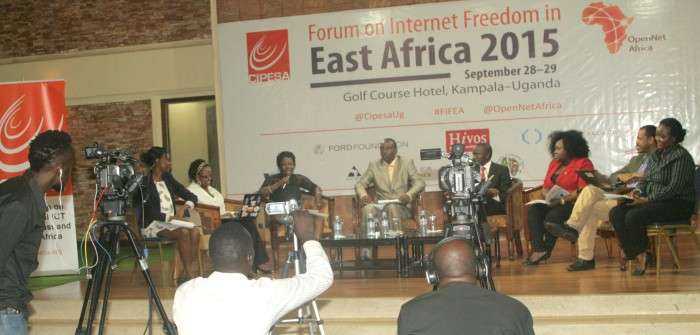By Juliet Nanfuka |
Towards the end of 2015, the Collaboration on International ICT Policy for East and Southern Africa (CIPESA) under the OpenNet Africa initiative convened some of Africa’s leading thought leaders to discuss the various facets of internet freedom in Africa.
The Forum on Internet Freedom in East Africa is one of very few gatherings that assemble an African audience within the continent to discuss matters related to upholding internet freedom. The Forum brought together 200 participants from 18 countries – triple the number of those who attended the inaugural 2014 forum, which hosted 85 participants from six countries. The event drew up a set of actionable recommendations that will inform onward engagements on advancing internet freedom in Africa by CIPESA and its partners, and hopefully for other actors in this space.
Over the course of two days, several issues were discussed, including how to address online violence against women (VAW), whose magnitude and manifestation is not clearly known, as most cases in Africa go unreported.
Another key highlight was the increase in freedom of expression violations for critical media and bloggers especially during periods of electioneering. One way to address this could be through the use of counter speech and transparency in combating hate speech, misinformation and false claims. The media’s role in advancing internet freedom in Africa – both as a vulnerable group but also as infomediaries – was highlighted.
Africa has registered a rise in abuses and attacks on internet freedom, including a proliferation of laws, legal and extralegal affronts, as well as limited judicial oversight over surveillance and interception of communications. Discussions on the balance between national security and its perpetual clash with freedom of expression, access to information and the right to privacy reflected the need to address gaps in existing laws that do not adequately protect citizens from mass surveillance and privacy infringements.
Meanwhile, the appreciation of digital safety tools and practices remains paramount, for citizens, the media, human rights defenders and activists. Thus, the continued need for capacity building and awareness raising efforts on internet freedom was stressed by Forum participants. Closely related to this is the need for localisation exercises between tools developers and end users, given the diverse contexts of African internet users.
Internet freedom could also be supported by the budding community of artists and creatives on the continent, who are currently not adequately involved in discussions around freedom of expression and privacy online.
Read the full Forum Report, which also explores the relationship between internet freedom and online economics, press freedom, online creative expression, access to information, cybercrime and digital safety, from the perspectives of law enforcement, regulators, intermediaries, artists, the media and human rights defenders. On each of these themes, the report discusses the challenges and opportunities and suggests actions to take in order to advance internet freedom in Africa.

